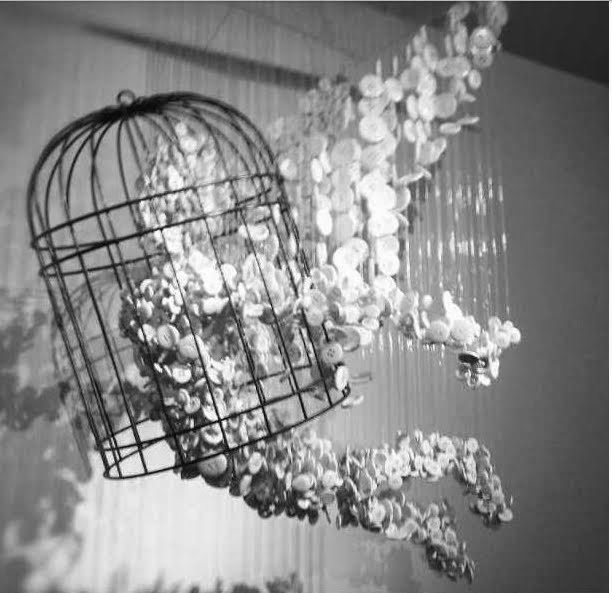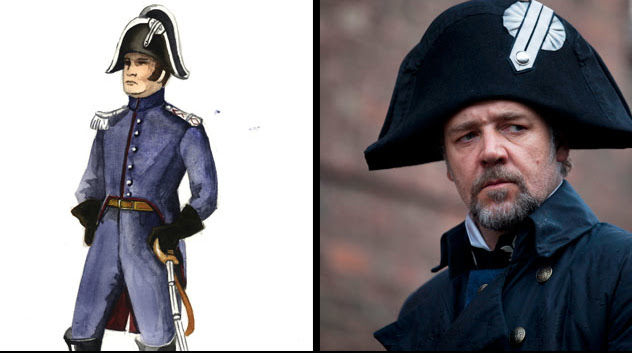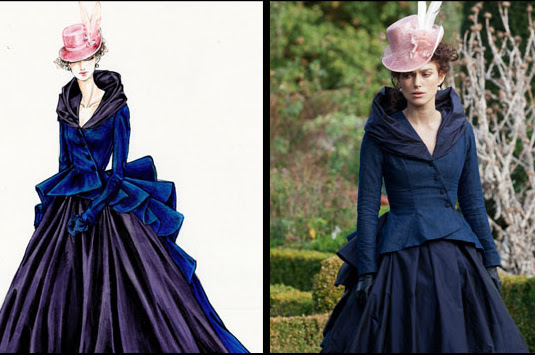An amazing article from The Hollywood Reporter, gives an insight into what it is truly like being a costume designer...
THR's Costume Designer Roundtable: Dressing Actors Is 'Somewhere Between a War and a Circus' The pros behind this season's best-dressed films talk about taking direction from Tim Burton and Steven Spielberg, and how too many glimpses in the mirror are a sign of talent's insecurity.
This story first appeared in the Dec. 14 issue of The Hollywood Reporter magazine.
None of the men and women who participated in THR's first-ever Costume Designer Roundtable set out to become costume designers. Colleen Atwood -- who created Queen Ravenna's sinister, twisted costumes in Snow White and the Huntsman -- came to her career late, after she raised a daughter as a single mother. Jacqueline Durran had a philosophy degree and an entry-level job at a London costume house; this year, she infusedAnna Karenina with modernity, mixing early 18th century Russian tradition with '50s couture silhouettes. Mark Bridges, whose work on The Master evoked 1950s normality amid a cult leader's ascent, was a stage actor who used to make his own costumes. In Hitchcock, Julie Weiss, who started in theater as well, brought to life the iconic director, his wife, Alma, and starlet Janet Leigh in early '60s costumes, often using the color red to convey emotion and tension. And Joanna Johnston -- who extensively researched Civil War uniforms and reveals Mary Todd Lincoln's favorite color, fuchsia, inLincoln -- first envisioned a career in fashion. At the roundtable, the most laughter broke out when Paco Delgado, the force behind Les Miserables' authentic, romantically distressed costumes, recalled starting out in theater set design, admitting that back then, he imagined that doing costumes was "easy."
The Hollywood Reporter: What is the biggest misconception about your job? That people think, "Oh, aren't those pretty clothes?"
Julie Weiss: I think you just said it.
Joanna Johnston: My theory is that everybody gets dressed in the morning, so therefore it's a simple thing to do. [Costume design] is a deep and complicated and long-winded process. And I don't know why it is, because in the '40s, it was more revered as a profession, and everything was constructed.
Mark Bridges: I'll say that I'm a costume designer, and people will say, "Oh, that must be so much fun." And it is fun, but it's really planning and thoughts about so many things and interacting with actors and directors and now, more and more, accountants and producers.
Paco Delgado: You have to listen to what the director is saying, then the actor, then you have to start looking for your own inspiration. But then you have to start looking for things that sometimes you never find. You start like looking for a fabric that doesn't exist, but it is in your mind. And it's banging you and banging you. It has to be this fabric. And then one day you suddenly find something, and it might not be the fabric you wanted to find, but you get the illusion that it is the fabric. (Laughter.) And then you start making the whole dress, and it doesn't behave as you thought. I go to bed, and I think, "Oh, my God, why did I say that fabric?"
THR: How did you get into costume design?
Bridges: I was in theater, but I would always do my own costumes. I can remember doing a sketch at 14 of a costume. It was James Keller in The Miracle Worker. Having been a theater major, I know how actors need to prepare. So that helped me to be a better costume designer.
Colleen Atwood: I grew up in a really rural area in Washington state, and I wanted to be a painter. And I got pregnant in high school and had a baby. And so I raised my daughter by working at all kinds of jobs, from factory work to waitressing. When she was out of high school, I went to NYU and took a summer course there in film school, and ended up on the little projects, doing the clothes for some reason, and then starting to kind of be a runner and assistant in the costume world.
Delgado: I started working in theater, doing sets. But I always did the costumes like a side thing, like I didn't pay attention to them, really. I also thought they were like really easy. (Laughter.) I wasn't really interested in them to start with.
Weiss: We came into costume not because we said to Santa, "I want to be a costume designer," but because we were there on this quest to keep seeing. And all of us here, we're storytellers and we get paid for it, which will allow us to age a little easier. (Laughter.)
THR: So you guys are competitive, right
Weiss: We all know each other. We know that if you hear that Joanna got Lincoln, you say, "Well, great, at least it's going to be done right," and then you go in your car and you go, "I don't know how that happened." (Laughter.)
THR: Colleen, you have a long-running relationship with Tim Burton and Johnny Depp. When did that start?
Atwood: Edward Scissorhands. I met them both on that movie. I was shocked that I got the job because I hadn't done that many films. One of the great things about our job is that we do collaborate with these directors and actors and sort of develop shorthand with them.
THR: Does knowing, say, Burton's taste and some of his predilections help?
Atwood: Tim is one of the great graphic designers, as he has a phenomenal eye for what's important in a negative space. He is not a cluttery kind of guy. He came from animation, and there are elements of animation always, even in his realistic work. So knowing that about him is helpful.
THR: Joanna, you've been dealing with Mr. Spielberg for quite a while.
Johnston: The first one I did with him was Saving Private Ryan, which was another kind of totally ridiculous thought that I had, which was, "Oh, uniforms."
Bridges: So easy. (Laughter.)
Johnston: Easy, just uniforms, and my father is a military man. Wouldn't need too much time. Totally ridiculous. Uniforms are really complicated. You can go to six military experts and ask them any kind of question about one tiny detail. And they'll all say a different thing.
Weiss: But then you have an adviser who comes in after everything is done. I was working on a film with Jane Fonda, and a military adviser came. It was called The Dollmaker. And I was told that I had a patch upside down. And they'd already filmed the scene. There was this gentleman called Johnny Napolitano, and he knew everything, everything. I called, and I said: "He's got his patch upside down. We can't afford to reshoot it." He said, "Don't worry -- it just means his son died." (Laughter.)
THR: Can any of you go and see a film without noticing the costumes? What's the last film you saw where you didn't pay attention to the costumes?
Atwood: The Bond movie. I mean, I liked the costumes, but it didn't get in the way, like I wasn't obsessed about them or anything. The only time I really get distracted is when I think they're wrong. But I get more distracted by hair or a really bad wig than I do costumes any day of the week.
Jacqueline Durran: I think it's really terrible when you're watching a film and you can't work out whether it's modern or period. That's something that really distracts me.
Weiss: I can think back to when, in the middle of a love scene, I noticed that the clock was wrong.
THR: Can you recall a costume disaster that happened during your career?
Atwood: I try to forget those things.
Bridges: Well, a happy accident for me was during the prep of Boogie Nights. There was a place in the Midwest. Do you remember [the vintage warehouse] Hullabaloo?
Atwood: Yeah, sure, in St. Louis.
Bridges: They sent me to Hullabaloo, and it was all dead stock from the '70s that had never been sold, and I think I spent $12,000 just to get as much stuff as I thought I could use. I even got skates with the red Lucite wheels for Rollergirl, and the clothes went magically on all the principals. John C.[Reilly] somehow fit into these great pants that had never been worn by anybody else. So many iconic pieces in that film came from that trip.
THR: Is there an actor or director whom you've most enjoyed collaborating with?
Durran: When you work on a Mike Leigh film, you don't have a script. So all the relations are kind of backwards. And what happens is that you interview the actor about their character, and then you make the costume based on the information you've learned about the character, and that defines what the costume is going to be. It really, really brings you back to the character and the tiny details that could make that character sing.
Delgado: I think actors are normally very selfish in the way that they want to get you to create their costume to be the character. I think a good relationship with an actor is when you have this communication, and you finally find the costume that can define the character they're going to play.Hugh Jackman was great. It was really, really nice to work with him. But sometimes you have actors or actresses whom you don't click with at all.
Atwood: Some of the most amazing actors I've worked with put on their costume and don't even look in the mirror right away. They walk around in it, and they feel the costume, and there's something almost visceral about them sort of feeling what that is, as opposed to the conception that they're glued to the mirror for hours on end, which maybe later in their room they are, I don't know. Some of the most kind of glamorous, unexpected women don't really look at themselves in the mirror. It's also interesting that sometimes the people who haven't got a sense of achievement as an actor are very vulnerable that way, that they look in the mirror the whole time and don't feel anything. As a costume designer, you have to bring out the feeling that they're OK, that they're gonna do fine, and really support them and the journey they're making.
Weiss: Those extraordinary actors will just stand -- Robert De Niro just stands -- and you watch them become that person.
Johnston: I love that thing when the costume is close to completeness, and they look at themselves in the mirror, and there's just an immediate kind of, I don't know how to say it, it'd be like the penny's dropped as regards to the depiction of the character, because the costume department's always the first port of call, really. I love the fitting room. I love the sort of sacred, intimate relationship because we're building up trust and nurturing and being a bit of an ambassador.
Weiss: But that's the other important thing: What is a great costume? An actor has to wear that costume. A director directs the scene. Hopefully, when someone who's seen your film remembers it, they remember the whole picture. In a fitting -- we've all experienced this -- when someone puts on a period costume and they start to cry because it reminds them of somebody from a different time.
THR: You're now called upon to talk in great detail about your work.
Weiss: Now when you do a premiere or something, there's not only the photographs and all that, there's a line of twentysomethings tweeting away, who have a lot of excitement about costume. I know it can be a negative thing, too, but in fact, it's kind of nice.
THR: Do you see your work directly influencing fashion?
Weiss: Is it costume becoming fashion or fashion becoming costume? It used to be certain seasons or windows would change, and they would take more time in doing that. And now it's very rapid. So the clothes are out there, and glamour is accessible.
Atwood: You go to Los Angeles, and you can buy the same skirt that you can buy in Madrid that you can buy in Hong Kong. And then what we do is unique. In a way, I think that's tragic, the death of so many professions -- the old lady who did plumes.
Delgado: You are working in a movie, and you suddenly think, "Oh, I remember that old lady that used to embroider everything so beautifully." You run to her workshop, and it doesn't exist anymore. And I see that happening every day.
THR: Any regrets?
Weiss: Many. My career was my family. It is my family. At this point, well, I guess I could get stand-ins to call me. I could borrow your family for the holidays. Somehow I never have known how not to work. I'm still redesigning films that are already finished. Even when I don't have a job, somebody will have a story, somebody who will say that where I live is filled with too many things. And it is a depository of what other people can't part with -- like a Navy uniform, and he's just died, and the wife came over, and she said, "Take this."
Delgado: We are very fortunate to work in this business. That's what I think every day when I work.
THR: Any advice for anyone wanting a career in the field?
Delgado: It's a very obsessive job, I think. Very, very obsessive.
Johnston: I think films are somewhere between a war and a circus. It's the discipline of a war and it's the chaos and creativity of a circus.
Weiss: Be nice to everyone on the crew, the people just starting. Because they will be the studio heads. But be fair in how you define beauty because some people feel like a million bucks, and you'll walk right by them.








